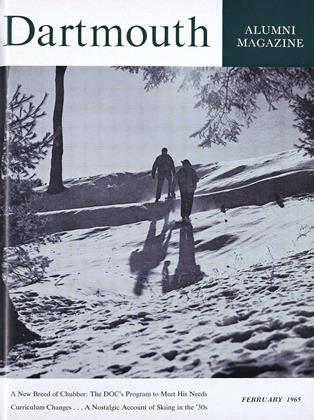By Yevgeny Yevtushenko with English rhymed translationby Oliver J. Frederiksen 'l6. Munich:Carl Gerber Verlag, Publishers, 1964. 77pp. $2.50.
Although he is still in his early thirties Yevtushenko is a very important figure in the Soviet literary world. This is not at all the same thing as saying that he is a great writer; as a matter of fact, he isn't. In a brief foreword Mr. Frederiksen shows that he is aware of Yevtushenko's limitations as a poet, but he argues that Winter Station will "keep a place in the history of Russian writing." This claim is probably justified if we speak in terms of literary history.
Yevtushenko, like the other writers of the new generation, is operating in a literary vacuum. These younger men reject the works of their immediate predecessors and are struggling to learn how to write. What we seem to be witnessing in present-day Russian literature is a telescoped period of literary apprenticeship. It is unlikely that any of the writers who have emerged in the past few years will become great poets or novelists. Probably, their task is to prepare the way, to lay the foundations upon which Russian literature can once again reach the heights of achievement which it attained during the 19th and early 20th Centuries. Provided, of course, that the Soviet government does not lay its deadening hand upon literature as it did under Stalin.
This long poem, in which Yevtushenko tells of a visit he paid to his home in Siberia and reminisces about his family's history and his own childhood, was one of several works published in 1956, dubbed by some Western critics the "year of protest." It was in 1956 that for the first time in a generation several Russian writers were able to publish works which spoke frankly about Soviet reality and made a plea for more generosity and nobility in human relations. As a work of this type Yevtushenko's Winter Station is worthy of the attention of anyone wishing to understand at least a part of what has been happening to Russian literature in the decade since Stalin's death.
Mr. Frederiksen's successful rhymed translation will enable English-speaking people to get the feel of Yevtushenko's verse as well as its meaning. Since Mr. Frederiksen gives the original text on 'facing pages, his book should also be of great value to students of Russian.
Assistant Professor of RussianLanguage and Literature
 View Full Issue
View Full Issue
More From This Issue
-
 Feature
FeatureA NEW BREED OF CHUBBER
February 1965 By JOHN ALDEN THAYER JR. '65 -
 Feature
Feature"It Was Quiet, Serene, and Beautiful"
February 1965 By GEORGE R. ANDREWS '37 -
 Feature
FeatureBusiness Still Draws Its Share of Graduates
February 1965 By ADDISON L. WINSHIP '42 -
 Feature
FeatureFreshman-Sophomore Curriculum Revised
February 1965 -
 Article
ArticleTHE UNDERGRADUATE CHAIR
February 1965 By BOB WILDAU '65 -
 Article
ArticleDartmouth's Story Superbly Told
February 1965 By ALBERT I. DICKERSON '30
JOHN G. GARRARD
Books
-
 Books
BooksPutting Your Best Food Forward
OCTOBER, 1908 By Carole Ann Stashwick, M.D. -
 Books
BooksAND ON THE EIGHTH DAY
December 1949 By Churchill P. Lathrop -
 Books
BooksTHE IDEAL BOOK
May 1936 By Herbert F. West -
 Books
BooksTHE LAST TIME I SAW THEM,
August 1946 By Herbert F. West '22 -
 Books
BooksTHE CIVILIAN AND THE MILITARY.
July 1956 By LEWIS D. STILWELL -
 Books
BooksA DIARY FROM DIXIE
January 1950 By William Randall Waterman


